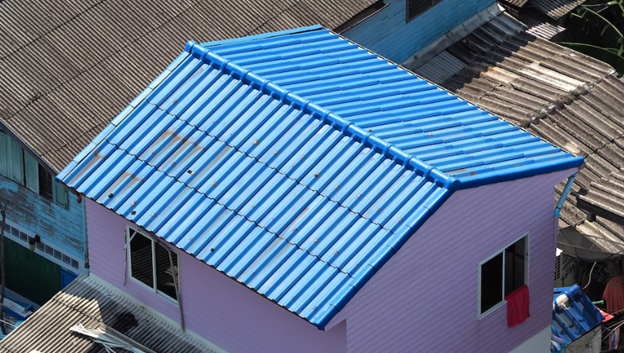Metal roofs have become increasingly popular for both residential and commercial properties. Their sleek aesthetic, exceptional durability and low-maintenance requirements offer numerous advantages over traditional roofing materials like asphalt shingles. But with various types of metal roofing available, understanding the different options and their benefits is crucial for making an informed decision.
The Allure of Metal Roofing:
The Metal roof boasts several compelling advantages that set them apart:
- Durability: Metal roofs are incredibly strong and can withstand harsh weather conditions, including heavy rain, snow, hail, and strong winds. With proper maintenance, a metal roof can last for several decades, significantly exceeding the lifespan of asphalt shingles.
- Low Maintenance: Metal roofs require minimal upkeep compared to other materials. They are generally resistant to rot, insect damage, and fire, and occasional cleaning with water is usually sufficient.
- Energy Efficiency: Metal roofs, particularly those with reflective coatings, can reflect sunlight and solar heat gain, reducing the amount of heat absorbed by your building. This translates to lower energy costs for cooling your home or commercial space.
- Environmental Benefits: Metal roofs are often made from recycled materials and can be recycled at the end of their lifespan. Additionally, their long lifespan reduces the need for frequent roof replacement, minimizing landfill waste.
- Lightweight: Metal roofs are surprisingly lightweight compared to other roofing materials like concrete tiles. This puts less stress on your building’s structure and can be beneficial for renovations or retrofitting older buildings.
- Aesthetics: Metal roofs come in a variety of styles, colors, and finishes. They can offer a modern, elegant look or a more rustic, traditional aesthetic depending on your preferences.
Exploring the Metal Roofing Landscape:
While the term “metal roof” encompasses a broad category, several popular choices exist:
- Standing Seam Metal Roofing: This popular option features interlocking panels that create a clean, modern look. Standing seam roofs are known for their exceptional weather resistance and durability.
- Metal Shingles: These mimic the appearance of traditional shingles but offer the strength and longevity of metal. Metal shingles come in a variety of styles and colors, allowing for a classic or contemporary aesthetic.
- Corrugated Metal Roofing: This corrugated sheet metal is a cost-effective option often used on agricultural buildings and industrial facilities. While not as aesthetically pleasing as other options, it offers good durability and weather resistance.
Factors to Consider Before Choosing Metal Roofing:
While metal roofs offer numerous advantages, it’s important to consider all aspects before making a decision:
- Initial Cost: Metal roofs generally have a higher initial cost compared to asphalt shingles. However, their long lifespan and low maintenance requirements can lead to significant cost savings over time.
- Noise: Metal roofs can be noisier than other materials during heavy rain or hail. Proper insulation and underlayment can mitigate this issue.
- Weight Considerations: While generally lightweight, some metal roofing options might require structural reinforcement for older buildings. Consult a qualified roofing contractor to assess your specific situation.
- Professional Installation: Metal roof installation requires specialized skills and expertise. Ensure you hire a certified and experienced metal roofing contractor to ensure proper installation and optimal performance.
Metal roofs are a robust and stylish roofing solution that can enhance the beauty and longevity of your property. By understanding the benefits and drawbacks of different metal roofing options, and by consulting with a qualified roofing professional, you can determine if a metal roof is the perfect choice for your home or commercial building.




